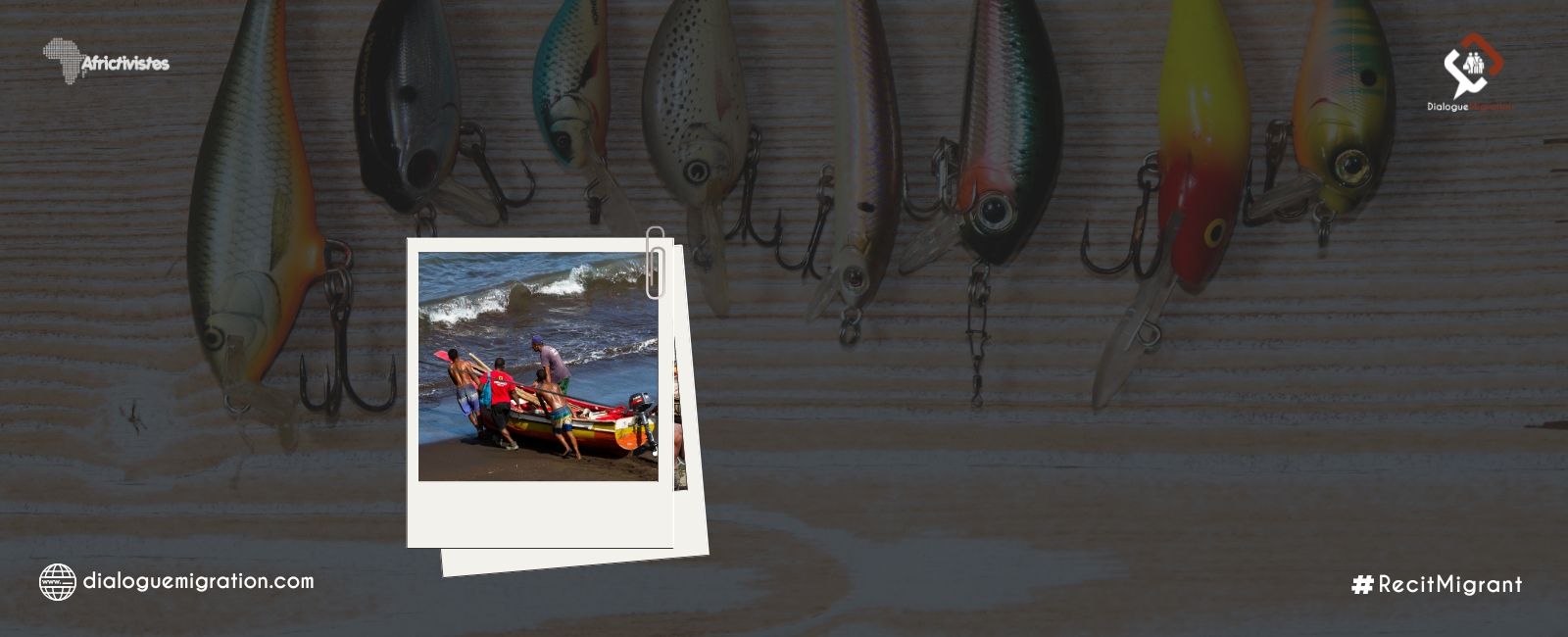

In Benin, non-nationals play an important role in the development of small-scale marine fishing. They contribute to the supply of fisheries resources at the fishing port of Cotonou, as well as in the seaside towns in southernBenin, along the coastline of the Gulf of Guinea, West Africa.
Labour from neighbouring countries plays an important role in small-scale marine fishing in Benin, based on the observation made by Dialogue Migration. From the fishing port of Cotonou to the seaside towns of Ouidah, Grand Popo, Illacondji and others, the observation remains the same.
This morning in September 2023, at the fishing port of Cotonou, fishing boats dock at the pier-landing stage, their provisions in their nets. It’s the return of the sea after hours of fishing. On shore, after hours of waiting to observe the open sea, expectations seem to have been fulfilled with the return of these motorised boats. Comlan Yaovi, a fisherman who collects a fishing merchant structure, manages a team of fishermen on the wharf. After a period of activity with his team, he lends himself to the questions of Dialogue Migration. “Mainly, there are more Ghanaians among us, then we have the Beninese. But at the fishing port, it is the Ghanaians who are the most represented,” he says.
The actors of small-scale marine fishing in Benin, he explains, ” are the ones on the front line, because it is in this activity that they were born. They have the expertise. The latter also have representatives, but are under the authority of the Beninese, who own the fishing boats and nets. They have mastered the type of fishing called ‘Watcha’ and they are enduring,” he adds.
The most widely spoken language in the area is Mina. A language common to the coastal peoples of Benin, Togo and Ghana, and mainly spoken in neighbouring Togo. Faced with this observation, “Ghanaians speak Mina, which is why there are not many Togolese here. There are only a few,” says Yaovi.
Labour melting pot
On the small-scale fishing boats, various flags of different countries are flying. Among others, the flags of Benin and Ghana can be seen. These flags are decorative objects and also for remote identification so that the boats can be perceived by others from a distance to avoid collisions, our sources add.
Under a shed next to a maintenance workshop from which the engines of boats roar, a dozen fishermen sit on mats preparing nets, bought in Lomé, the capital of neighbouring Togo.
According to sources from small-scale fishermen’s associations, there are more than 1,000 fishermen at the fishing port of Cotonou.
Dossou Dossa Kouassi, president of the Association of Marine and Assimilated Fishermen of Cotonou (APMAC), which has more than 800 fishermen, sits and works among his peers to speak to Dialogue Migration at the other end of the building.
“Among the fishermen here, there are at least 25 percent Ghanaians, 15 percent Togolese, 2 or 3 percent Nigerians,” says the man in his 50s. “When you arrive at any beach, you will find the Xla, the Houéda and the Togolese, especially the Xla (the Xla and the Houéda are Beninese ethnic groups, editor’s note),” he adds.
In addition, Dossou Dossa Kouassi, specifies that during the fishing season those from Grand-Popo, Aïguinnou, Agoué, and Kraké come to the pier-landing port of Cotonou.
“Our grandparents and fathers, our elders went to Ghana to learn the trade of fishing, to come to Benin,” he says. “However, to this day, the boats are bought in Ghana, and a good part of the labour comes from there.”
FFishing types and associated labour force
Small-scale marine fishing in Benin has a number of peculiarities. Generally, the owners of fishing nets and fishing boats are Beninese. However, in order to carry out this activity, the Beninese owners of nets and boats go to Ghana to look for qualified labour to work for them. These are paid at the end of the fishing season which normally runs from June to February. However, this period appears to be changing due to climate change. Our sources did not wish to comment on the terms of the remuneration. However, as far as the demand for labour is concerned, “It is according to the fishing that I want to do, that I will go and get people in Ghana,” says the president of APMAC. “Beach seining requires a lot of manpower; We need at least 40 people,” he says. “Once in Ghana and the type of fishing is decided, firstly, there will be a bosco who will look for the skilled workers. If the crew comes, you’re going to have a meeting and say what you want to do,” he said.
“For shark fishing, you need 7 to 8 people; for the purse seine 12 to 15 people; for exocet at least 8 people. If it’s called ‘Sovi’, if there are three or four of you it’s good, and if it’s ‘Tohoungua’, 5 or 6 people can be enough,” he says. And for each type of fishing, the related net.
Tordro Doviaou Tegbikpota, is one of the longest-serving Ghanaians in Benin in the small-scale marine fishing sector. “I’ve been here for a long time, it’s been around 50 years already. Today, I could say that I am a native of Ghana but I consider myself a Beninese,” he says, sitting among other Beninese. Today, he owns fishing boats and nets. He married and had children who in turn married in Benin.
Fishing in Benin is an important sector of activity for the country’s economy. It contributes 3% to GDP, provides more than 600,000 jobs and employs more than 15% of the working population. Sea fishing and inland fishing are the two major fishing sectors in the country. According to public administration statistics, Beninese production rose to 82,000 tons of fish in 2020. However, 34% of Benin’s local needs are covered by Beninese fishing.


